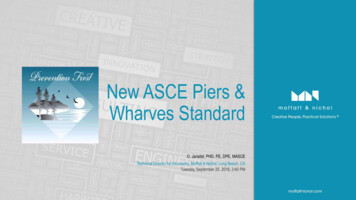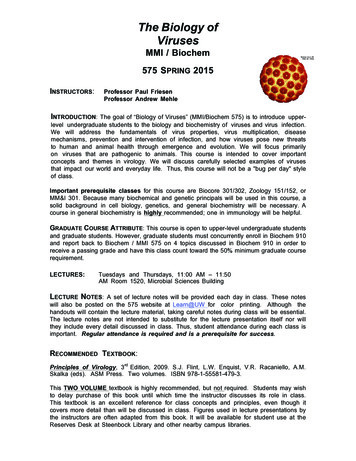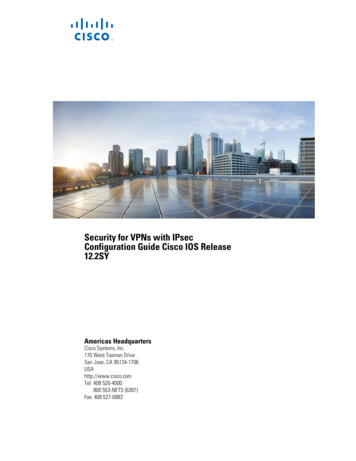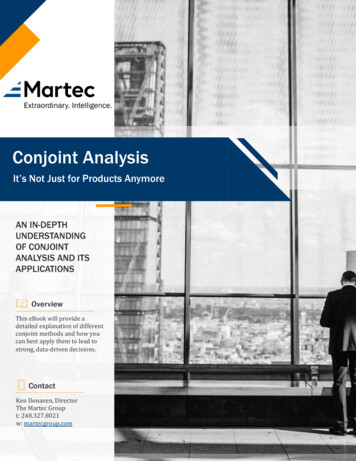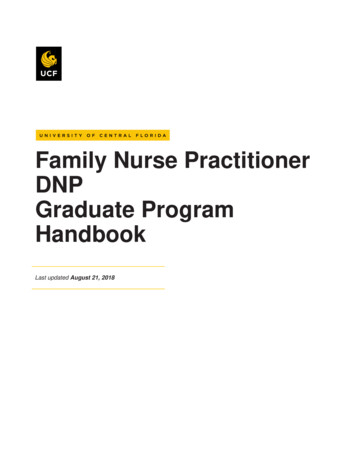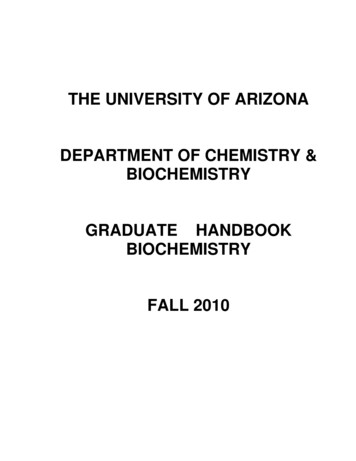
Transcription
THE UNIVERSITY OF ARIZONADEPARTMENT OF CHEMISTRY &BIOCHEMISTRYGRADUATE HANDBOOKBIOCHEMISTRYFALL 2010
TABLE OF CONTENTSA. General Description of the Biochemistry Graduate ProgramSample Academic CalendarB. Expectations for the students and faculty:1.2.3.What faculty expect from studentsWhat the student should expect of the dissertation advisor and his/her committeeWhat the student should expect of the departmentC. University of Arizona Academic Code of Integrity and Code of Conduct(excerpts)D. Graduate Program Committee Structure and FunctionE. Financial Assistance While Pursuing the Ph.D. or M.S. Degrees1.2.Teaching AssistantshipsResearch AssistantshipsF. Departmental and Graduate College Policies1.2.3.4.5.6.Registration PolicyAcademic Probation Policy and Standards of CourseworkGrade Replacement OptionTeaching Probation PolicyContinuous EnrollmentLeave of AbsenceG. Coursework for the Ph.D. Degree in Biochemistry1.2.3.4.5.6.7.8.9.Total CreditsTransfer CreditsCollege TeachingResearch OpportunitiesRequired CourseworkElective CoursesSeminarGroup MeetingDissertation ResearchH. Graduate Programs of Study and WorksheetsBiochemistryBCPBiochemistry track of the MCBBMCB track of the MCBElective CoursesAdditional Course Requirements400-Level CoursesMinor SubjectsBiochemistry Graduate Course Listing
I.Satisfactory Academic Progress1.2.3.4.Laboratory rotations and choice of major advisorSelecting a Dissertation CommitteeChanging Research DirectorsKeeping the Dissertation Committee Updated on Progress Toward the Ph.D. DegreeJ. Examinations and Advancement to Candidacy1.2.Evaluation ExaminationsDescription of the Comprehensive Examinationsi) Written Examsii) Oral ExamK. Dissertation and Final DefenseL. Index
A. GENERAL DESCRIPTION OF THE BIOCHEMISTRY GRADUATE PROGRAMThis handbook summarizes the graduate student requirements for the Ph.D. degree in theBiochemistry program of the Department of Chemistry and Biochemistry. There may beadditional requirements for students who are involved in the interdepartmental graduateprograms [(Biochemistry and Molecular & Cellular Biology (BMCB) or the Biological ChemistryProgram (BCP)], and students should also be familiar with these requirements.It is important to realize that successful completion of a graduate degree program inBiochemistry is the student’s responsibility. All of the necessary steps that are required to finallyreceive the degree are important. The student should utilize resources the Graduate Collegemakes available, including the Graduate Catalog and the Graduate College Handbook. ThisDepartment of Chemistry and Biochemistry Graduate Handbook is designed to assist studentsthrough the maze of graduate school requirements, but it is not all-inclusive. It is meant to be auseful guide, but does NOT serve as a contractual document.The Dissertation Advisor, along with the Dissertation or Dissertation Committee, will serve asguides and mentors to help train each student as a scientist. Finally, the Graduate ProgramCoordinator and the Graduate Program Committee will do everything they can to keep studentson track and to point them in the right direction. Nevertheless, each student needs to befocused and self-motivated to reach his/her goals.1
SAMPLE ACADEMIC CALENDARYear 1Fall 2010Laboratory rotation one - August 23 – October 15, 2010Laboratory rotation two – October 18 – December 8, 2010Coursework (for example, see page 7)Department Retreat - TBASpring 2011Laboratory rotation three - January 12 – March 4, 2010Laboratory rotation four – March 9 – May 4, 2011CourseworkYear 2Fall 2011CourseworkDissertation ResearchDepartmental Retreat (TBA)Select Dissertation CommitteeHold first Dissertation Committee MeetingComplete Plan of StudySpring 2012CourseworkDissertation ResearchTeaching Assistantship (flexible, may be in Year 3)Undertake written and oral comprehensive examsYears 3 and beyondCoursework, as neededDissertation ResearchAnnual Dissertation Committee Meeting2
B. EXPECTATIONS OF STUDENT & FACULTY1. WHAT THE FACULTY EXPECT FROM THE STUDENTSThe faculty expect the students in this program to abide by the University of Arizona AcademicCode of Conduct and the Academic Code of Integrity, as summarized in Section C of thisHandbook. Failure to do so, at any time, may be grounds for dismissal from the graduateprogram, and from The University of Arizona. In addition, the faculty’s expectations of thegraduate students in this Program are:Researcha) to discover and enthusiastically pursue a unique topic of research in order to participate inthe construction of new knowledge in your chosen field, and in the application of thatknowledge to the solving of new problems in the chemical sciences,b) to learn the research methods and historical knowledge basis of the discipline -- honoringthe scholarship of those who came before and learning what is needed to form viableresearch hypotheses,c) to communicate regularly with faculty mentors and the masters/doctoral committees,especially in matters relating to your research and progress within the degree program,d) to exercise the highest integrity in all aspects of your work, especially in the tasks ofcollecting, analyzing and presenting research data,e) to work responsibly toward completion of the degree in a timely fashion,f) to mentor other students in the group and foster the regular exchange of research ideas andteamwork between group members.Teachinga) to participate enthusiastically in appropriate training and evaluation, by the TA evaluationcommittee of all instructional roles you are asked to take on,b) to take on (as opportunities arise) an appropriately sequenced variety of teaching dutiesrelevant to your career expectations and likelihoods,c) to devote the same seriousness to undergraduate instructional duties that you would expectfrom your own instructors, remembering that you are an employee of the State of Arizona inyour role as a teaching assistant.Professional Development/Program Progressa) to develop, to the extent possible, a broad network of professional relations,b) to contribute, wherever possible, to the discourse of the scholarly discipline throughconference presentations, publications, collaborative projects, and other means,c) to seek out a range of faculty and peer mentors that can help you prepare for a variety ofprofessional and career roles and responsibilities,d) to take responsibility for keeping informed of regulations and policies governing yourgraduate studies and to complete all required paperwork and other degree obligations in atimely fashion.3
Communitya) to create, in your classrooms and laboratories, an ethos of collegiality andcollaboration,b) to realize your responsibilities as an individual and professional representative ofboth the university as a whole and the department or program in which you arestudying,c) to assist graduate student peers in their own professional and scholarlydevelopment.2.WHAT THE STUDENT SHOULD EXPECT OF THE DISSERTATION ADVISORAND HIS/HER COMMITTEEIn general, you should expect your Dissertation Advisor to:a) be willing to meet with you regularly,b) be someone with whom you can talk freely and easily about research ideas, andyour professional development, and who never feels threatened by your capabilities,c) be someone you can trust to look out for your professional interests,d) be willing and enthusiastic in giving you credit for the work you do,e) be willing to tell you when your work does or does not meet the standards he/shehas set for their research program,f) be willing to help you graduate in a reasonable time frame, with a dissertation whichtells a complete story, and is representative of Ph.D. level research at all of our peerinstitutions,g) have an active well-functioning research group for additional support when you areencountering difficulties.It is unreasonable to expect one person to have all of the mentor qualities that youdesire. You should therefore choose dissertation committee members who complementthe strengths of your advisor.3. WHAT THE STUDENT SHOULD EXPECT OF THE DEPARTMENTa) A guarantee of funding for up to 5 years from the time of enrollment, provided thatyou remain in good standing in the program, and are making adequate progresstoward completion of the Ph.D. degree,b) Opportunities to develop skills beyond your specialty through seminars, shortcourses in department facilities, and interactions with renowned researchers,c) Opportunities to provide feedback to the department and to review policies to ensurethe quality of the department,A guarantee that current students will not be held responsible for new requirementsimplemented in the middle of their tenure within the department, i.e. that you are heldaccountable for the rules in place in the Graduate Handbook, at the time of youradmission.4
FALL 2010 INCOMING GRADUATE STUDENTSChem/BioFirst NameLast NameUniversityChemAliAbbaspour TamijaniUniversity of TehranChemMarkAgasidUniversity of California-San DiegoChemEmanAkamUniversity of New HampshireChemJulieAndersonTemple UniversityChemChristopherAtcherleyUniversity of DenverChemLeonardBrightSouthern Illinois Univ-EdwardsvilleChemYuCaoXiamen UniversityBiochemUdeepChawlaJamia Milia IslamiaChemPi-YuChenNational Central UniversityChemIsaacChogiiUniversity of NairobiChemNicoleGagnonSt. Johns UniversityChemSarahGerhardtUniversity of ArizonaChemDawitGhebrehiwotUniversity of AsmaraChemGraceGithaigaUniversity of NairobiChemJaredGriebelCase WesternBiochemSaraHallIndiana University BloomingtonChemDivyaIyerBioinformatics Institute of IndiaChemEvanJonesWillamette UniversityChemYueJuXiamen UniversityChemJohnKeoghUniversity of ArizonaChemPitambarKhanalTribhuvan UniversityChemVladKumirovUniversity of ArizonaChemNicholasLaudeUniversity of Texas – AustinChemDanielMiesEvergreen State CollegeChemEricMitchellUniversity of ArizonaBiochemMicahNelpMesa State CollegeChemAlfredaNelsonNew Mexico State UniversityChemKhaNgyuen ThiIrkusk State TechnicalChemRicardoPalos PachecoUniversidad Autonoma de Ciudad JuarezBiochemKaylaPolzinWillamette UniversityChemDanielPritchardSonoma State UniversityChemRoystonQuintynQueen Mary University of LondonChemDavidRackeHillsdale CollegeChemNiliniRanbadugeAsian International SchoolChemEhamparamRamananUniversity of PeradeniyaChemKeeperSharkeyUniversity of ArizonaChemRionShupeUniversity of LouisvilleChemStevenSillUniversity of Wisconsin – Stevens PointChemSanhitaSinharayIndian Inst of Tech-MadrasChemYangSongPeking UniversityBiochemRajshreeSrivastavaUniversity of Texas – ArlingtonChemLuisTorres FigueroaUniversity of Puerto RicoChemEdonVitakuIdaho State UniversityChemRichardVreelandTowson UniversityChemJinyanWangEast China Normal UniversityBiochemWarnerWeberArizona State UniversityChemLuyi (Roy)YangXiamen UniversityBiochemAnthonyYoungArizona State University5
ChemZhonghaoZhangBeijing UniversityChemYilongZhengTsinghua University6
C.ACADEMIC CODE OF INTEGRITY AND CODE OF CONDUCTGraduate Students in the Department of Chemistry and Biochemistry, Universityof Arizona are expected to have read, and understand, the following excerpts fromthe Academic Code of Conduct for the University of Arizona.Excerpts and highlights from the Code of Academic Integrity for the University ofArizona: egrity and ethical behavior are expected of every student in all academic work. This AcademicIntegrity principle stands for honesty in all class work, and ethical conduct in all labs and clinicalassignments. This principle is furthered by the student Code of Conduct and disciplinaryprocedures established by ABOR Policies 5-308 through 5-404, all provisions of which apply to allUniversity of Arizona students. This Code of Academic Integrity (hereinafter "the Code") isintended to fulfill the requirement imposed by ABOR Policy 5-403.A.4 and otherwise tosupplement the student Code of Conduct as permitted by ABOR Policy 5-308.C.1.PROHIBITED CONDUCTConduct prohibited by the Code consists of all forms of academic dishonesty, including, but notlimited to:1. Cheating, fabrication, facilitating academic dishonesty, and plagiarism as set out and definedin the Student Code of Conduct, ABOR Policy 5-308-E.6, E.10 and F.12. Submitting an item of academic work that has previously been submitted without fair citation ofthe original work or authorization by the faculty member supervising the work.3. Violating required professional ethics rules contained or referenced in the student handbook(hardcopy or online) of undergraduate or graduate programs, or professional colleges.4. Violating health, safety or ethical requirements to gain any unfair advantage in lab(s) or clinicalassignments.5. Failing to observe rules of academic integrity established by a faculty member for a particularcourse.6. Attempting to commit an act prohibited by this Code. Any attempt to commit an act prohibitedby these rules shall be subject to sanctions to the same extent as completed acts.7. Assisting or attempting to assist another to violate this Code.STUDENT RESPONSIBILITYStudents engaging in academic dishonesty diminish their education and bring discredit to theacademic community. Students shall not violate the Code of Academic Integrity and shall avoidsituations likely to compromise academic integrity. Students shall observe the generallyapplicable provisions of this Code whether or not faculty members establish special rules ofacademic integrity for particular classes. Students are not excused from complying with this Codebecause of faculty members’ failure to prevent cheating.FACULTY RESPONSIBILITYFaculty members shall foster an expectation of academic integrity and shall notify students oftheir policy for the submission of academic work that has previously been submitted for academicadvancement, as well as any special rules of academic integrity or ethics established for aparticular class or program (e.g. whether or not a faculty member permits collaboration oncoursework; ethical requirements, for lab and clinical assignments; etc.) and make everyreasonable effort to avoid situations conducive to infractions of the Code.STUDENT RIGHTSStudents have the right to a fair consideration of the charges, to see the evidence, and toconfidentiality as allowed by law and fairness to other affected persons. Procedures under theCode shall be conducted in a confidential manner, although a student has the right to an advisorin any appeal to a University Hearing Board under this Code.7
ACADEMIC INTEGRITY PROCEDURESI. Faculty-Student ConferenceThe faculty member of record for the course (i.e., responsible for signing the grade sheet)conducts these procedures. Faculty shall make sure that students receive notice and fairconsideration of the charges against them. The faculty member must confer with the studentwithin 15 academic days (hereinafter referred to as "days") of receiving evidence of a suspectedviolation of this Code, unless good cause is shown for an extension of no more than 30 days. Thefaculty member shall confer with the student in private, explain the allegations, present anyevidence, and hear the student's response. If more than one student is involved in an incident,separate conferences are recommended but not required. When dealing with students who areunavailable for the conference, students not enrolled in the class, or graduate students, refer tothe General Provisions.After the conference the faculty member shall decide, by a preponderance of the evidence,whether or not the student has committed an act prohibited by this Code. "Preponderance of theevidence" means that it is more likely than not that a violation of this Code occurred. If theevidence does not support a finding of a violation, the University will make no record of theincident in any University files. The student may continue in the class without prejudice.If the evidence supports a finding that the student has engaged in misconduct, the facultymember shall impose sanctions after considering the seriousness of the misconduct, thestudent's state of mind, and the harm done to the University and to other students. In addition, thefaculty member shall consider mitigating and aggravating factors in accordance with theprovisions of ABOR Policy 5-308.H. A faculty member may impose any one or a combination ofthe following sanctions: a written warning, loss of credit for the work involved, reduction in grade,notation of the violation(s) on the student’s transcript (temporary or permanent), or a failing gradein the course. The faculty member may also impose a sanction of suspension or expulsion fromthe program, department, college, or University. Within 10 days of the conference, the facultymember shall prepare a written decision outlining the charges, evidence, findings, conclusionsand sanctions imposed. The faculty member should use the standard form entitled "Record ofFaculty-Student Conference," and furnish copies to the student (as provided in the "Notice"section under General Provisions) and to all others as noted on the form, including the Dean ofStudents Office. See the General Provisions section for Grade Before Appeals.II. Additional Sanctions for Multiple ViolationsMultiple violations of this Code may subject students to additional sanctions, including suspensionor expulsion at the discretion of the Dean of the student’s College ("Academic Dean") or his/herdesignee. Students found responsible by a faculty member for a violation of the Code mustimmediately contact the Dean of Students Office to determine if they have multiple violationssubjecting them to additional sanctions by their Academic Deans.Upon receiving the Record of Faculty-Student Conference, the Dean of Students Office will notifythe student and the Academic Dean of the existence of multiple violations. The Academic Deanwill decide if any additional sanctions are to be imposed on the student as a result of multipleviolations. The Academic Dean will convey this information to the faculty member, the studentand the Dean of the college where the violation occurred ("Dean of the College"), as provided inthe "Notice" section under General Provisions. The Academic Dean should use the form entitled"Sanctions for Multiple Violations," and outline the findings and conclusions supporting his/herdecision for an additional sanction. If the case is appealed as set forth below, the Academic Deanwill present the case for the additional sanction.III. Appeal to Dean of the CollegeThe student may appeal the faculty member’s decision and sanctions to the Dean of the College8
or his/her designee. The student shall deliver the written appeal to the Dean of the College within10 days of the date on which the notice of the decision is received. The Dean of the College mayextend this filing period if the student shows good cause for the extension. If a student does notappeal within the time provided, the decision and sanctions of the faculty member will be final.Within 15 days of receiving the appeal, the Dean of the College shall review the faculty member’sdecision, sanctions and supporting evidence, and shall confer with the faculty member and thestudent. The Dean of the College shall have the authority to uphold, modify, or rescind the facultymember’s decision and sanctions. If the Dean of the College finds:1. that the conclusion of a violation is not supported by the evidence, then he/she shallrender a finding of no violation and that the sanction(s) imposed be rescinded.2. that the conclusion of a violation is supported by the evidence and the sanction imposedis appropriate, then he/she shall uphold the faculty member's decision and sanction(s).3. that the conclusion of a violation is supported by the evidence, and the sanction(s)imposed are inadequate or excessive, then he/she shall modify the sanction(s) asappropriate.The Dean of the College shall notify the student, the faculty member and the Dean of Students inwriting of his/her decision as provided in the "Notice" section under General Provisions. The Deanof the College should use the form "Record of Appeal to Dean of the College" for this purpose. Ifthe Dean of the College fails to act within the 15 day period, the student may, within 10 daysthereafter, appeal to a University Hearing Board by providing a written notice of appeal to theDean of Students Office. If the Dean of the College decides no violation occurred, all reference tothe charge shall be removed from the student's University records, and the student may continuein the class without prejudice. If the semester has ended, the faculty member shall calculate thegrade without the sanction. If work was not completed due to the academic integrity allegation,the faculty member and the student shall confer and a grade of "W" or "I" shall be assigned. If agrade of "I" is assigned, the student shall have the opportunity to complete remaining workwithout prejudiceIV. Interim Action1. The Dean of the College involved may suspend the student from one or more classes, clinicsor labs for an interim period prior to resolution of the academic integrity proceeding if the Deanbelieves that the information supporting the allegations of academic misconduct is reliable anddetermines that the continued presence of the student in classes or class-related activities posesa significant threat to any person or property.2. The Dean must provide a written notice of the interim suspension to the student, with a copyto the Provost. The interim suspension will become effective immediately as of the date of thewritten notice.3. A student who is suspended for an interim period may request a meeting with the Provost orhis/her designee to review the Dean’s decision and to respond to the allegations that he or sheposes a threat, by making a written request to the Provost for a meeting, including the student’sdates of availability. The Provost or his/her designee will schedule the meeting no later than five(5) days following receipt of the written request and decide whether the reasons for imposing theinterim suspension are supported by the available evidence.4. The interim suspension will remain in effect until a final decision has been made on thepending academic misconduct charges or until the Provost, or his/her designee, determines thatthe reasons for imposing the interim suspension no longer exist or are not supported by theavailable evidence.V. Appeal to University Hearing BoardThe student may appeal any decision of the Dean of the College or the Academic Dean thatimposes suspension or expulsion or provides for a notation on the student’s transcript. The9
student may also appeal if the Dean of the College failed to act within the 15 day period. TheDean may grant the student the option to appeal if the sanction of a failing grade is imposed andthe Dean believes reasonable persons would disagree on whether a violation occurred. Theappeal must be filed within 10 days from receipt of the decision or the Dean of the College’sfailure to act, by providing written notice of appeal to the Dean of Students Office. If a studentdoes not appeal within the time provided, the decisions of the Academic Dean, and the Dean ofthe College or the faculty member if the Dean of the College failed to act, will be final. TheUniversity Hearing Board shall follow the procedures set forth in the Student DisciplinaryProcedures ABOR Policy 5-403.D. with the following modifications:1. The Hearing Board shall be composed of three faculty and two students and shallconvene within 30 working days of the time the student files the appeal.2. Wherever the term Vice President of Student Affairs appears, it shall be replaced withSenior Vice President for Academic Affairs/Provost. The Provost is empowered tochange grades and the Registrar shall accept the Provost's decision. The Provost shallalso notify the parties of the final decision.3. Wherever the Dean of Students is indicated as presenting evidence or witnesses, it shallbe replaced with the faculty member who made the charges or his/her representative.Additionally, the Academic Dean or designee may also present evidence to supportsanctions for multiple violations.4. The student may be assisted throughout the proceedings by an advisor or may berepresented by an attorney. If the student is represented by an attorney, the facultymember may also be represented by an attorney selected by the University AttorneysOffice.5. The faculty member has the same right as students to challenge the participation of anyBoard member, as noted in the Student Disciplinary Procedures (5-403.D.3.f.)6. The Board may, in its recommendations, address any egregious violations of process.7. Sanctions for multiple violations will be recommended and presented to the Board by theAcademic Dean or his/her designee.GENERAL PROVISIONSAcademic Day - “Academic Days” are the days in which school is in session during the regularfall and spring semesters, excluding weekends and holidays. If possible, Faculty-StudentConferences and appeals may be heard during the summer or winter break. The Dean of theCollege or Dean of Students may extend these time limits when serving the interests of a fairconsideration or for good cause shown.Advisor – An individual selected by the student to advise him/her. The advisor may be a facultyor staff member, student, attorney, or other representative of the student. The student will beresponsible for any fees charged by the advisor.Grade Before Appeals - Students must be allowed to continue in class without prejudice until allun-expired or pending appeals are completed. If the semester ends before all appeals areconcluded, a grade of "I" shall be recorded until appeals are completed.Graduate Students - In cases involving graduate students, faculty shall follow the proceduresoutlined for undergraduate students except that in all cases where the student is found to haveviolated the Code, the faculty member (and in the case of appeals, the Dean of the College orHearing Board) shall notify the Associate Dean of the Graduate College.Notice - Whenever notice is required in these procedures it shall be written notice delivered byhand or by other means that provides for verification of delivery.Record - Whenever a sanction is imposed, the sanction and the rationale shall be recorded in thestudent's academic file. It is recommended that the standard forms "Record of Faculty-StudentConference," "Record of Appeal to Department Chair," and "Record of Modification of Sanctions"10
be used. These forms are available from the Dean of Students office. Students may petition theSenior Vice President for Academic Affairs/Provost after five years from the semester of thedetermination or upon graduation, whichever occurs first, to have the record expunged.Rights and Responsibilities of Witnesses - Witnesses are expected to cooperate in anyproceedings under this Code. The privacy of a witness shall be protected to the extent allowedby law and with consideration to fairness to the students charged and other affected persons.Retaliation of any kind against witnesses is prohibited and shall be treated as a violation of theStudent Code of Conduct or of the applicable University rules.Students or Faculty Not Available For Conference - In cases where the student is notavailable, e.g. out of the area after final exams, the faculty member shall make every reasonableeffort to contact the student through personal contact, telephone, University email, or mail toinform the student of the charges. If the faculty member is able to contact the student, theFaculty-Student Conference shall be scheduled as soon as both parties are available, e.g. at thebeginning of next semester. The student shall be given the of Incomplete until the conference isheld. If either of the parties will not be available for an extended period, the Faculty-StudentConference shall be held via the telephone or by mail. If after several efforts, contact cannot beestablished, the faculty member may impose sanctions but must send a letter or copy of the"Record of Faculty-Student Conference" form via certified return receipt requested mail to thestudent's last permanent address outlining the charges, findings, conclusions and sanctions.Students Not In Class - If students not enrolled in the class are involved in a violation of thisCode, faculty shall file a Code of Conduct complaint with the Dean of Students office.11
All policies found in the Policy Manual are subject to change from time to time asapproved by the Arizona Board of Regents. The central office disseminates hard copies ofadditions/revisions not more than 3 times each year. The web copy, located athttp://www.abor.asu.edu, is updated every 1-2 months, as needed. Prior to acting inreliance upon a specific board policy as it appears in any copy of the policy manual,please check to make sure that the board has not recently approved anyadditions/revisions to that specific policy.5-303 Prohibited ConductThe following misconduct is subject to disciplinary action:1. All forms of student academic dishonesty, including cheating, fabrication, facilitatingacademic dishonesty and plagiarism.2. Intentionally or recklessly causing physical harm to any person on the university campusor at a university sponsored activity, or intentionally or recklessly causing reasonableapprehension of such harm.3. Unauthorized use, possession or storage of any weapon, explosive device or fireworkson the university campus or at a university-sponsored activity.4. Initiating or causing to be initiated any false report, warning or threat of fire, explosion orother emergency on the university campus or at a university-sponsored activity.5. Intentionally or recklessly interfering with normal university or university-sponsoredactivities, including, but not limited to, studying, teaching, research, universityadministration, or fire, police, or emergency ser
receive the degree are important. The student should utilize resources the Graduate College makes available, including the Graduate Catalog and the Graduate College Handbook. This Department of Chemistry and Biochemistry Graduate Handbook is designed to assist students through the maze of graduate school requirements, but it is not all-inclusive.


